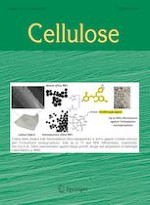01.09.2022 | Original Research
Cellulose-based functional polycarbonates as degradable enzyme carriers
Erschienen in: Cellulose | Ausgabe 16/2022
EinloggenAktivieren Sie unsere intelligente Suche, um passende Fachinhalte oder Patente zu finden.
Wählen Sie Textabschnitte aus um mit Künstlicher Intelligenz passenden Patente zu finden. powered by
Markieren Sie Textabschnitte, um KI-gestützt weitere passende Inhalte zu finden. powered by
